52+ Sample Rental Applications
-
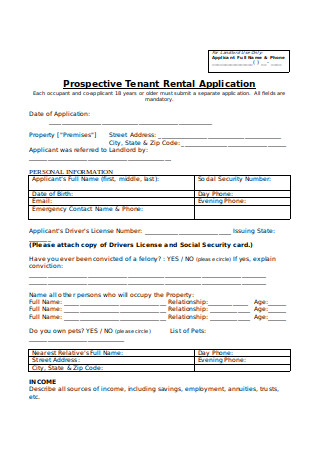
Prospective Tenant Rental Application
-
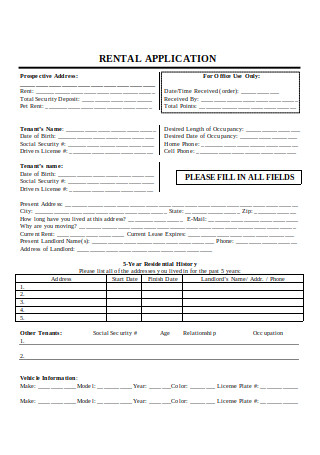
Rental Application
-
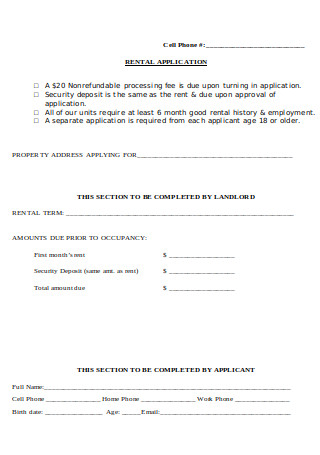
Rental Application Sample
-
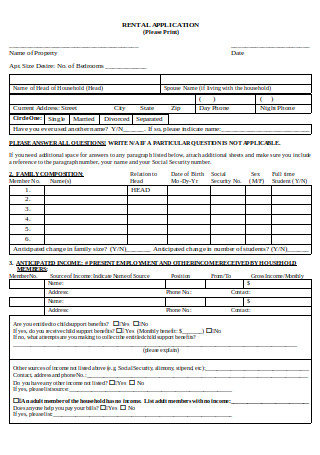
Rental Application Format
-
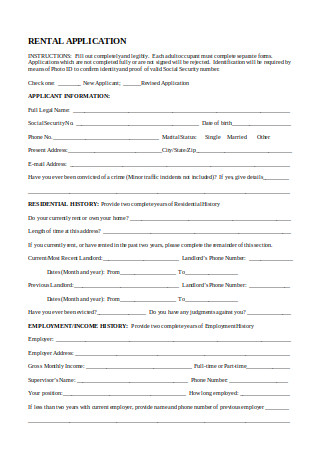
Printable Rental Application
-
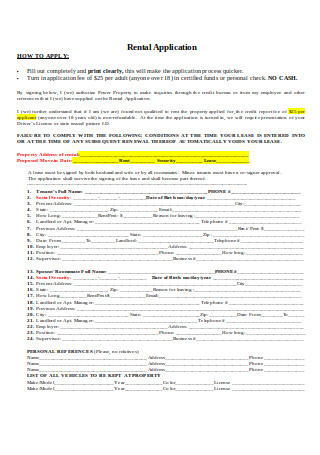
Property Rental Application
-
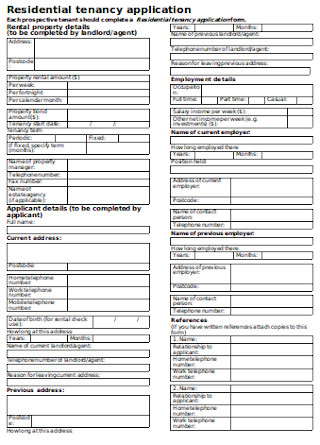
Residential Tenancy Application
-
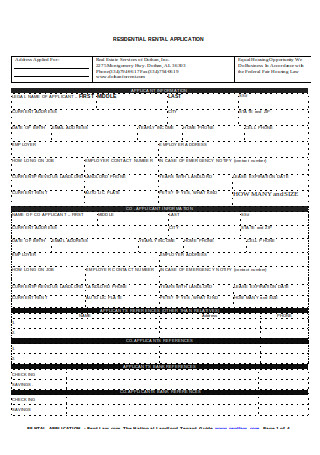
Residential Rental Application
-
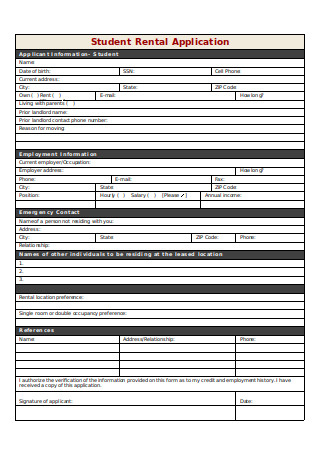
Student Rental Application
-
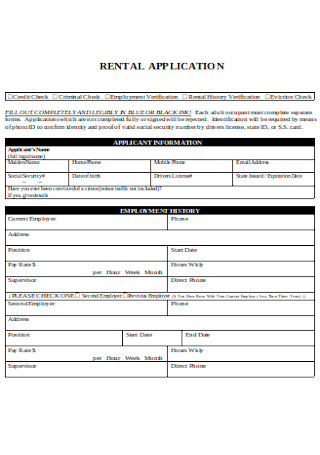
Basic Rental Application
-
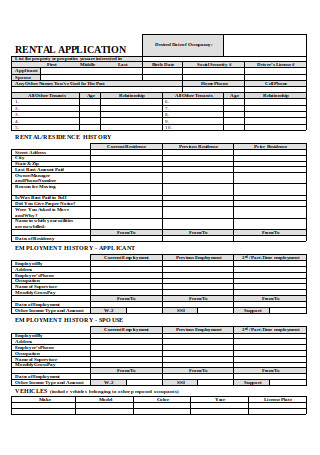
Sample Property Rental Application
-
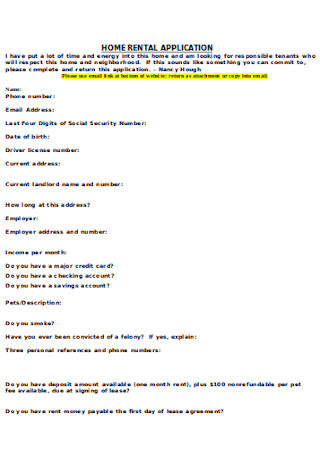
Home Rental Application
-
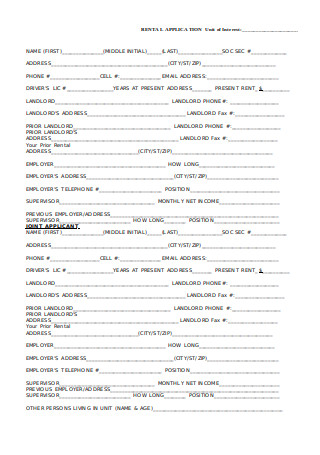
Blank Rental Application
-
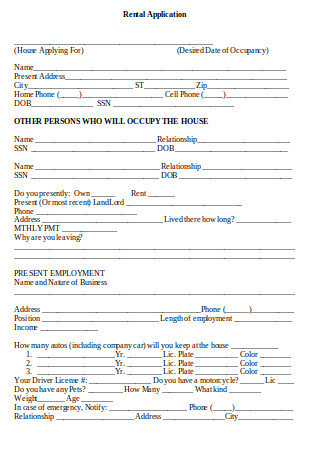
House Rental Application
-
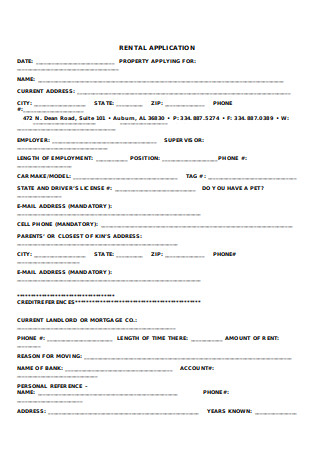
Properties Rental Application
-
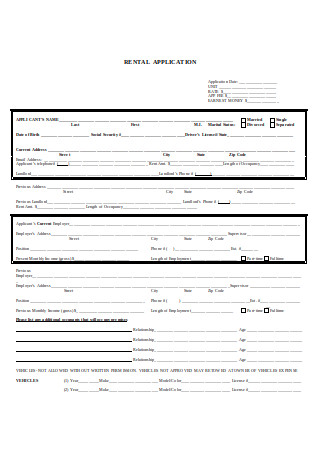
Apartment Rental Application
-
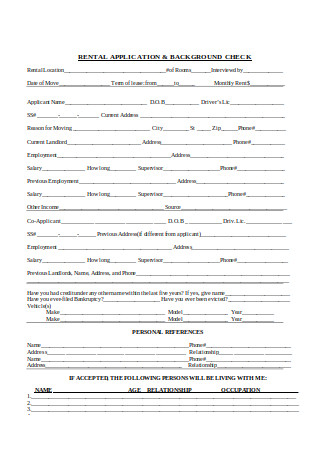
Rental Application and Background Check
-
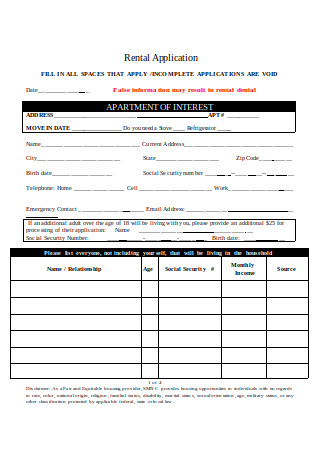
Tenant Rental Application
-
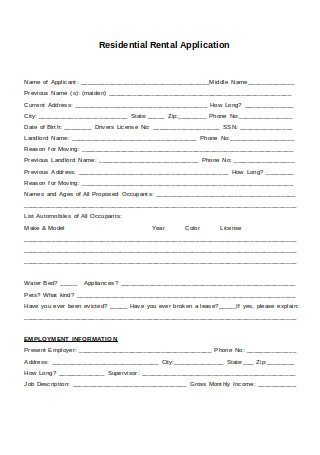
Residential Rental Application Sample
-
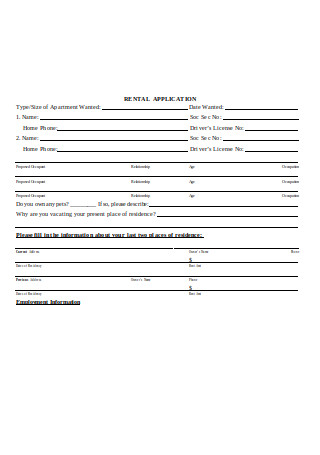
Format of Rental Application
-
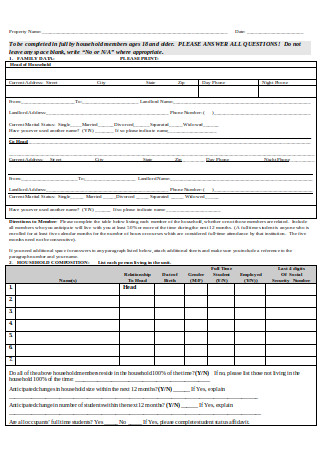
Application for Rental Leasing
-
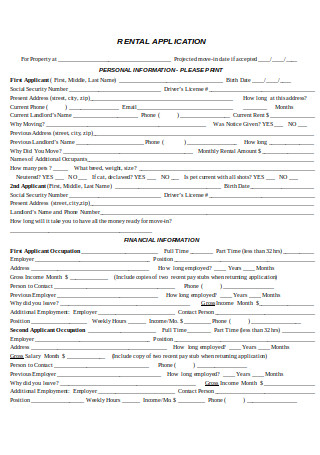
Rental Application for Property
-
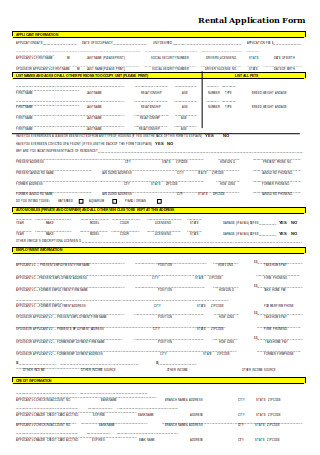
Rental Application Form
-
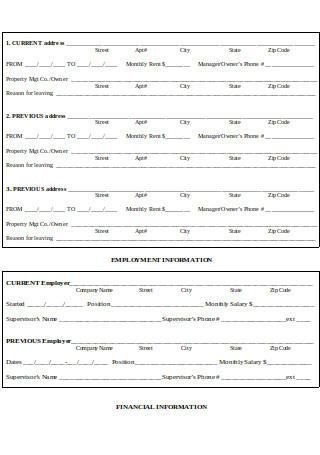
Properties Rental Application Form
-
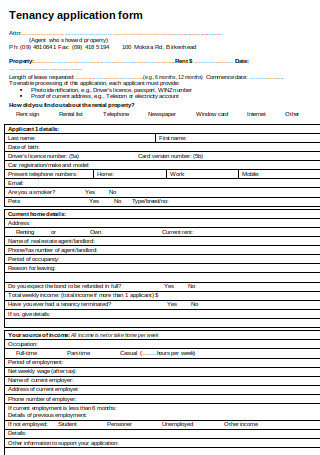
Tenancy Application Form
-
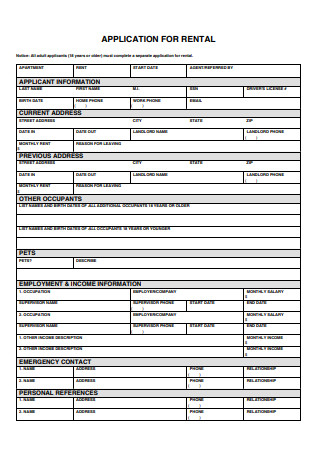
Application for Rental
-
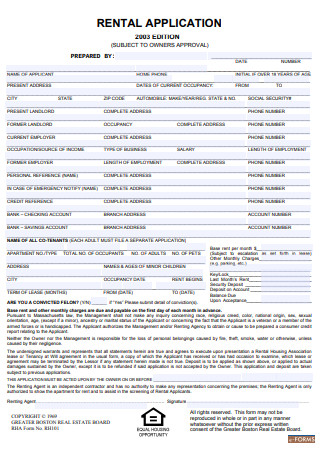
Housing Rental Application
-
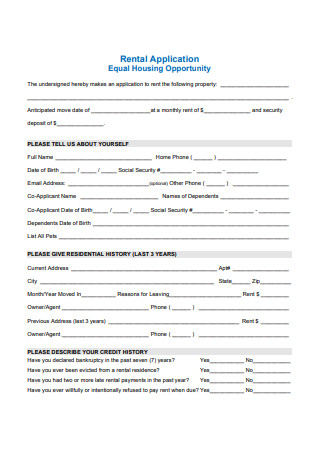
Basic Rental Application Sample
-
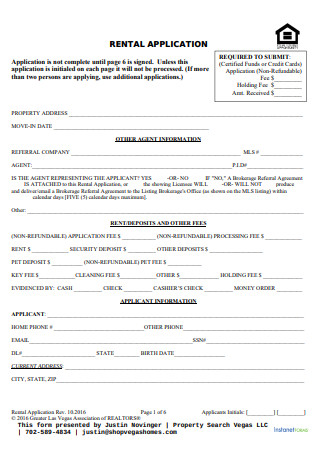
Real Estate Rental Application
-
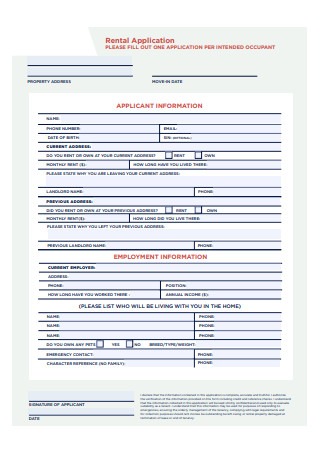
Applicants Rental Application
-
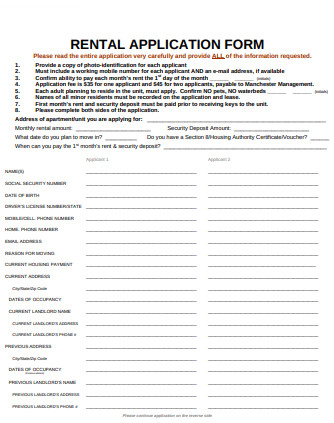
Format of Rental Application Form
-
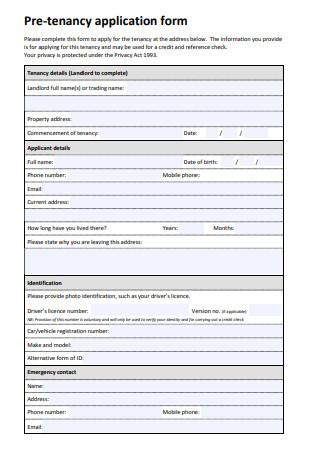
Pre-Tenancy Application Form
-
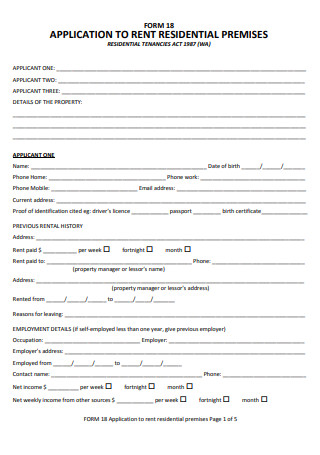
Application to Rent Residential
-
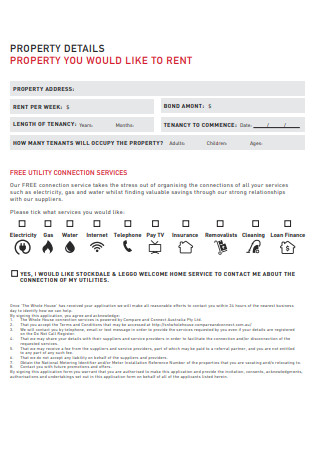
Home Rental Application Form
-
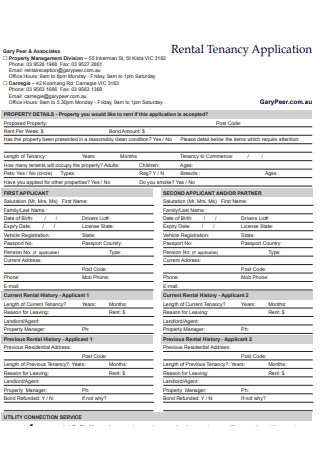
Basic Rental Tenancy Application
-
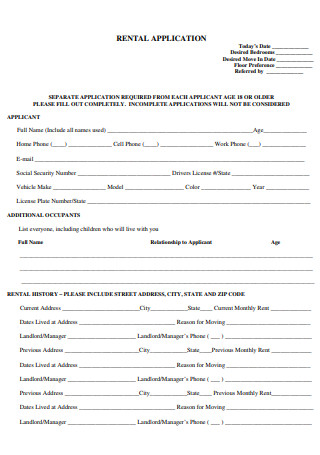
Sample Blank Rental Application
-
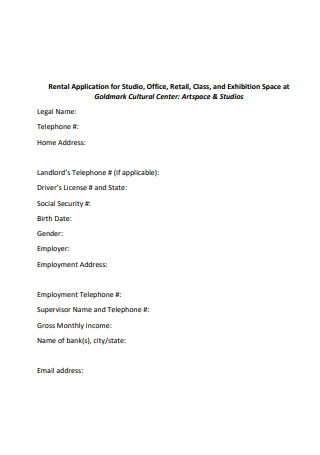
Cultural Center Rental Application
-
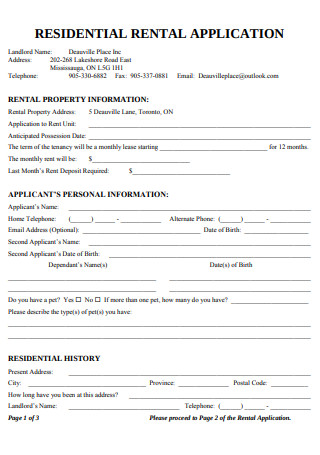
Simple Residential Rental Application
-
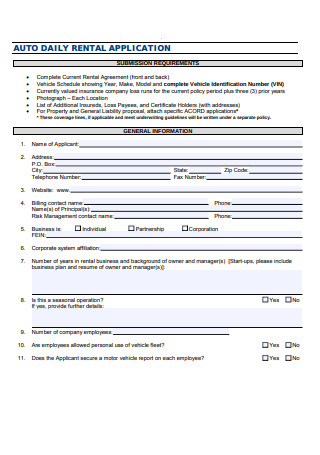
Application for Auto Daily Rental
-
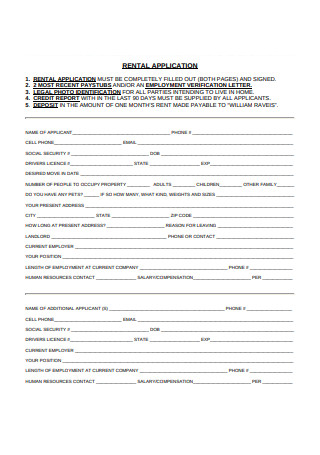
Tenant Rental Application Sample
-
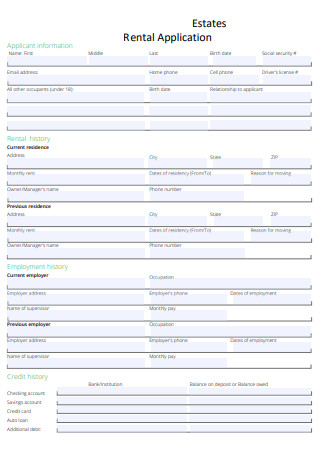
Estates Rental Application
-
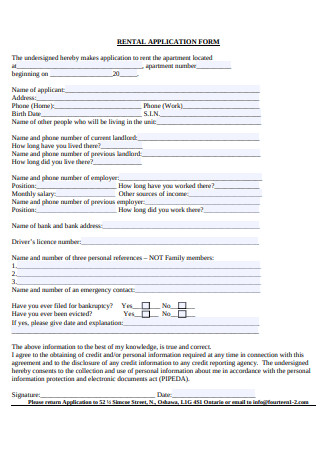
Basic Rental Application Form
-
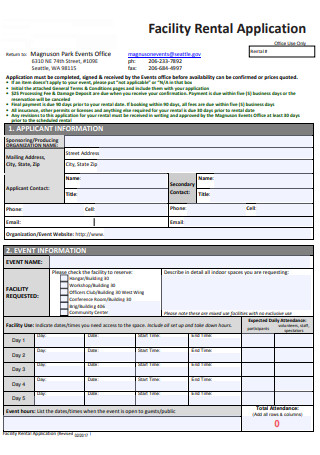
Indoor Rental Application
-
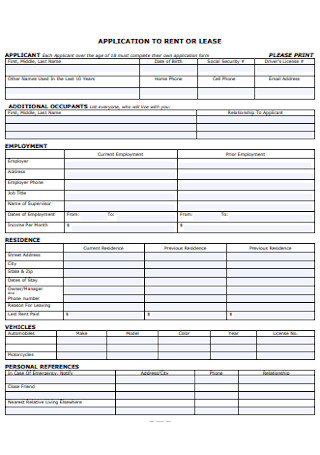
Application to Rent or Lease
-
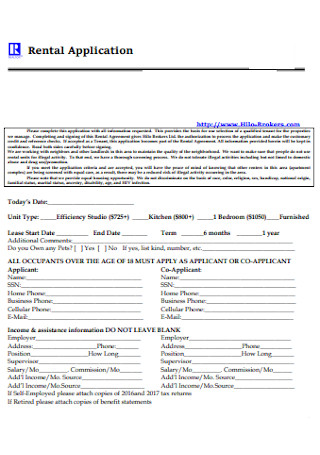
Villas Rental Application
-
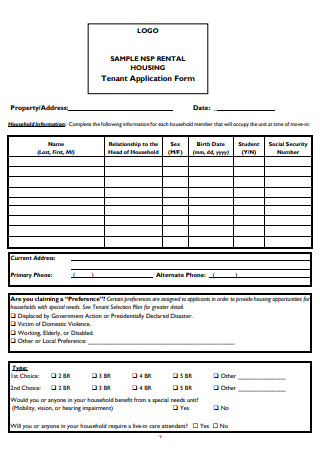
Rental Housing Tenant Application Form
-
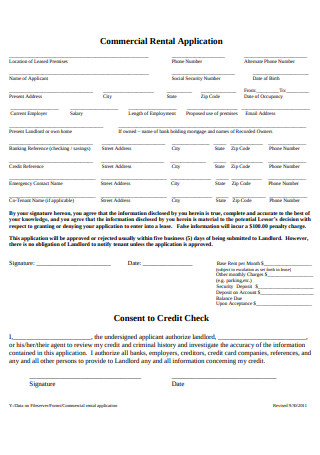
Commercial Rental Application
-
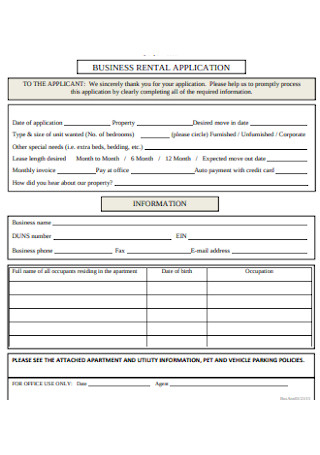
Business Rental Application
-
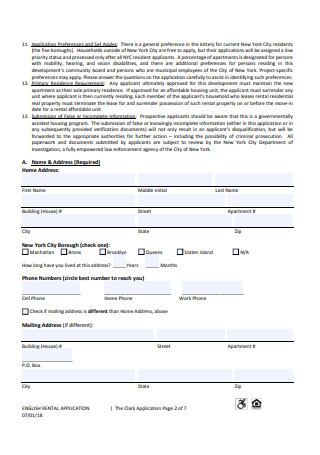
Application for Rental Apartment
-
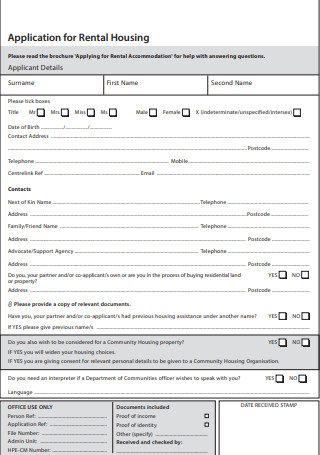
Application for Rental Housing
-
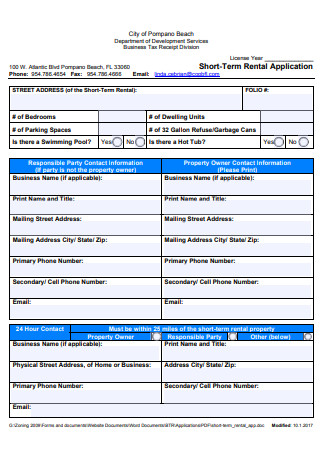
Short-Term Rental Application
-
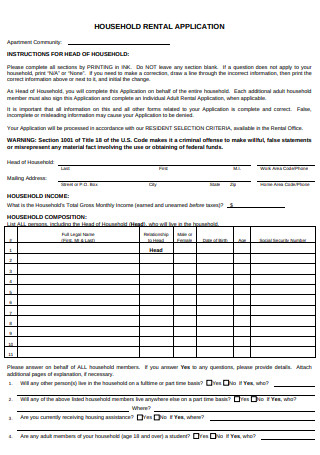
Household Rental Application
-
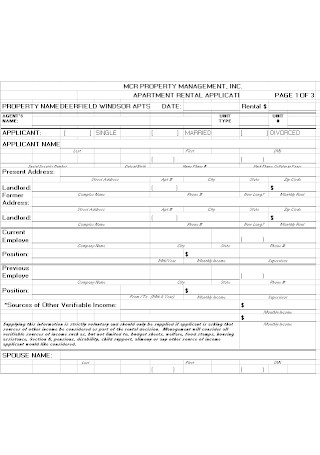
Aprtment Rental Application Template
download now
What Is a Rental Application?
A rental application is used by property owners to collect information on potential renters. The document contains an applicant’s necessary information, including their full legal name, social security number, contact information, and the name of their employer. This allows a landlord to assess the applicant well enough to make the decision of granting him or her to lease the space. Most rental applications require tenants to provide some proof of employment to show that they are capable of meeting their monthly dues. The last thing any landlord would want is to file an eviction notice for someone who has consistently failed to pay their rent on time. Problem tenants often carry a reputation for having a poor rental history that unsuspecting landlords become victims of after failing to perform a proper screening. An applicant’s rental history can be useful for landlords who want to make sure that the people residing in their rental property do not possess any records that could cause the current landlord some sort of trouble. Speaking to a previous landlord also gives the current landlord the opportunity to set their expectations for the tenant.
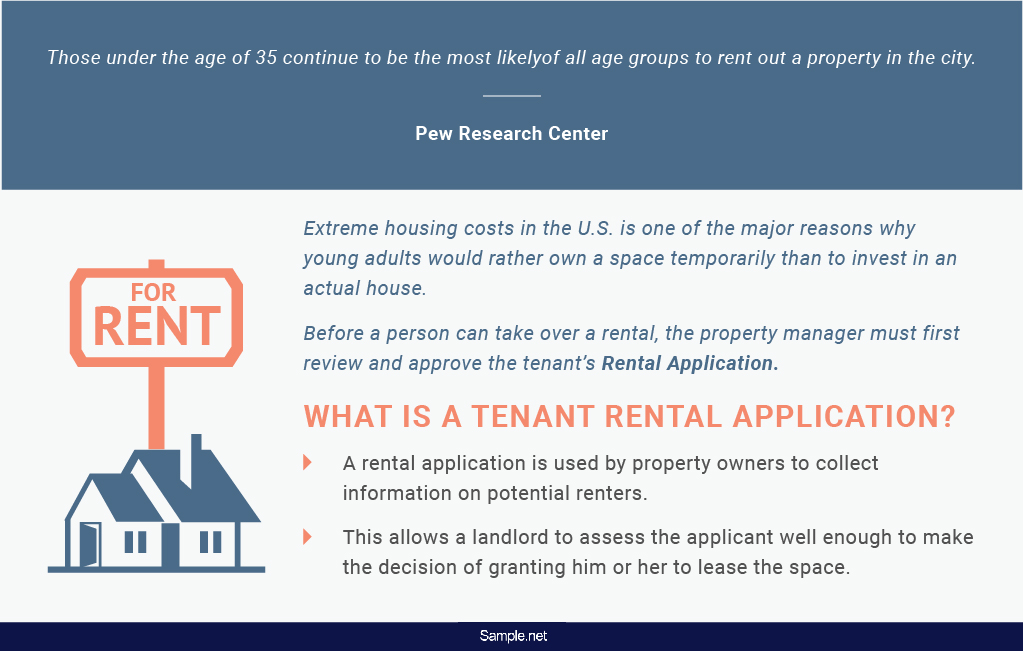
Basic Elements of a Rental Application
A simple rental application aims to supply landlords with a clear overview of a prospective tenant for a more accurate assessment. The information gathered by the landlord should make it easier to determine the applicant’s potential to rent out the property. But to do so, the rental application must consist of the following elements:
Any questions that may be classified as discrimination on the rental application should be reported to the authorities. There is a legal standard that property owners are obliged to uphold in order to keep out of trouble. Discrimination against an applicant is most apparent if the application asks for the birthplace, religion, and sexual orientation of the applicant, along with any disabilities that the individual may possess.
The Advantages of a Rental Application
Rental applications can be a valuable screening instrument for landlords that want to eliminate the existence of bad tenants in their property. It allows the landlord to screen each applicant’s credibility for the safety and security of the business and its tenants. Although landlords have the freedom to lease a property to a tenant without having to process a formal application, a rental application offers many benefits to property managers that use them. Applicants with a criminal history tend to look for rental properties that make it easy to hide out from the authorities, which is not something you want to find yourself in the middle of. These forms are designed to obtain detailed information that may be taken into account when deciding whether the applicant meets the desired criteria for tenancy. It also enables a landlord to run credit checks by getting written permission to perform the act with the applicant’s consent. If approved, the landlord and tenant may then authorize a lease agreement.
However, landlords need to be careful about the timing of these applications. Asking a person to complete a form full of personal details can be disconcerting if it is done in the early stages of the search. The idea of sharing pertinent information about yourself to someone you barely know can be inappropriate, especially if it has to be filled through online transmission. This will only discourage people from pursuing their application or hinder them from providing honest answers to each question. Given how easy it is for a person to input false information into the form, landlords may ask you to acknowledge the truthfulness of the data provided and to agree to a background check for further evaluation.
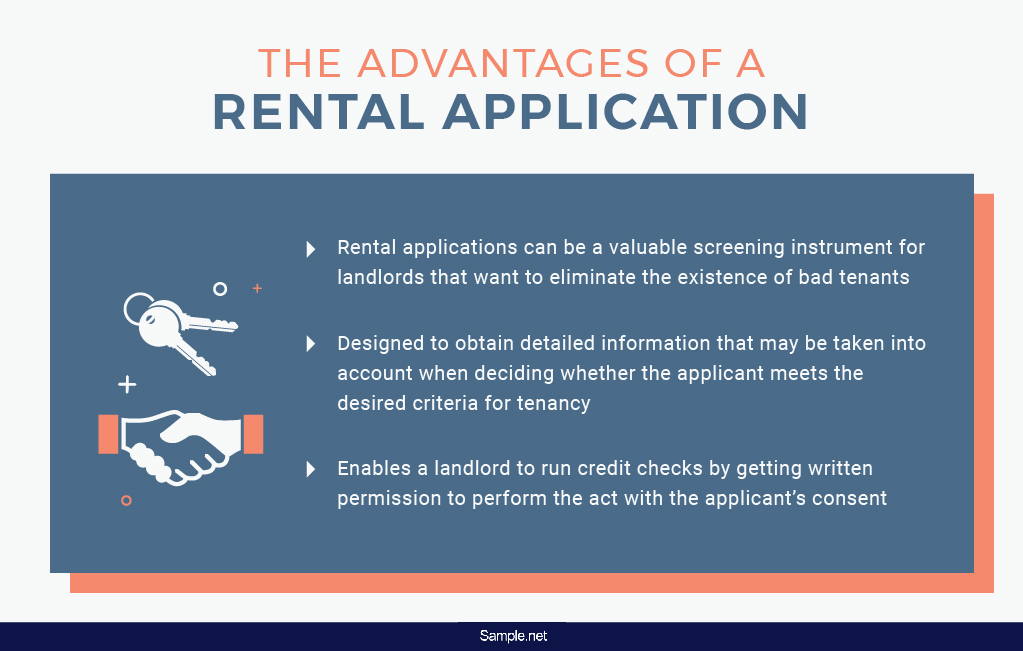
How to Prepare a Rental Application
According to Statista, about 27% of Americans reside in rented homes. While the figure may seem small, let’s not forget that there are over three hundred million people that live in the U.S. alone. If you do the math, you could be competing with over a dozen other applicants for a rental unit in your area. Looking for a place to stay can be a stressful experience for any renter, which is why you want to make the most out of every opportunity by making a rental application that is worth considering.
Step 1: Get a Copy of the Application Form
With your lack of experience and the short amount of time available, using a rental application template would be your best option. You can use the online version of the application or download the file in your preferred format and open it using a word processor of your choice. The file is likely compatible with any program, so you won’t have to worry about the struggle of file conversions and unexpected file corruptions.
Step 2: Fill in the Blanks with the Required Information
Once you have obtained a blank rental application form from a reliable source, you can fill it out with the essentials. This includes your personal data, contact details, rental history, and employment information. If you have a co-signer or a roommate for the lease, their information must be reflected in the document as well. A typical rental application will require your name, address, phone number, emergency contacts, a photo ID, and many more.
Step 3: Pay the Rental Application Fee
The application fee would depend on a variety of factors, such as the location of the rental unit or the rate established by the landlord. Processing fees are sometimes accounted for as well. The application fee will be used to fund the credit and background checks in order to verify the information inputted in your form.
Step 4: Expect a Background Check
Since you’ve already paid a fee to move forward with your application, you can expect a background and credit check anytime. This is deemed necessary to ensure that potential tenants carry a clean history that won’t cause the management any trouble. One’s employment records and criminal history are often given the most attention to help evaluate the applicant’s potential for leasing. Landlords also want to make sure that tenants are financially responsible enough to make ends meet.
Once you’ve done your part of the process, all that there is left to do is wait until the property owner gives you an update on your application.
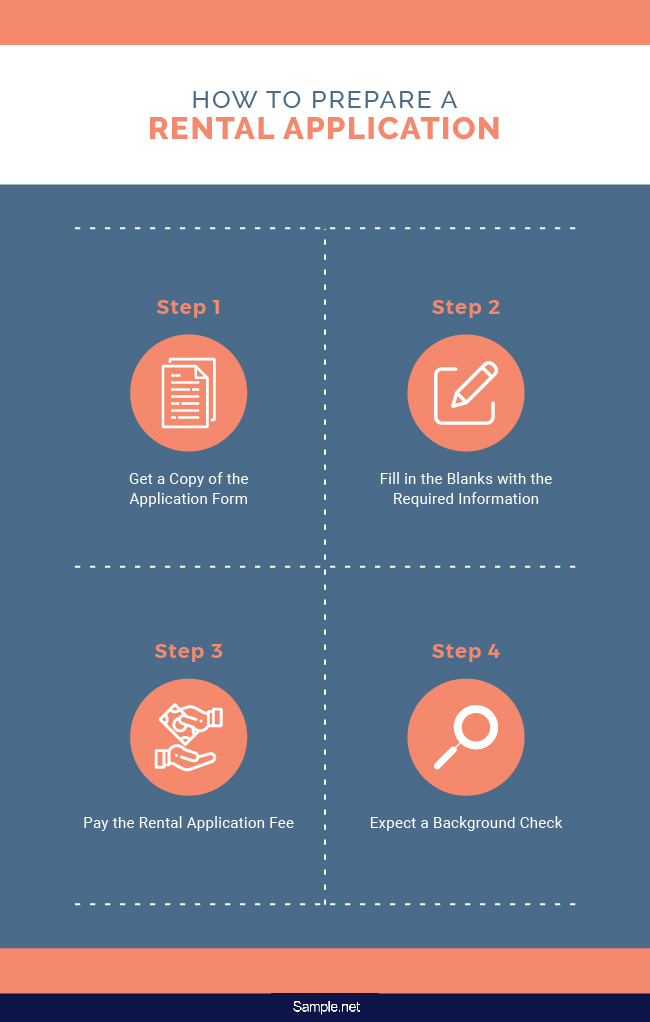
The Dos and Don’ts of a Rental Application
Finding the perfect residential or commercial space to rent can be the most draining part of moving. You’ll spend most of your time going through rental listings to locate a suitable space. But once you find your dream place, you still need to worry about getting your application accepted by the landlord. There’s a lot of pressure that goes into this process, so you need to make sure you do everything right.
The Dos
1. Do prove that you can afford the property.
Secure bank statements and pay stubs from the place you work to prove that you can afford the rental space available. Even if you plan to rent the apartment with a few roommates to split on costs, they should also prepare the same financial documents as evidence of financial stability. A healthy employment record may also serve as proof of a steady income flow in order to meet your rental dues every month.
2. Do choose reliable references.
Using a friend or family member as a reference in your application isn’t exactly a wise choice. The close relationship you share with the said individual can make it seem like a blind recommendation that landlords won’t be able to take seriously. You need to choose people who are confident and articulate in the way they sell you as a prospective tenant. Any connections you have with previous landlords or employers could also come to your advantage when you request for a tenant (landlord) letter of recommendation.
3. Do inspect the property during the weekdays.
To discover more ways to improve your rental application, avoid visiting the property on the weekends when the owner or manager is too busy with other visitors to attend to all of your concerns. Coming at a time when the place is buzzing with applicants can put you at a disadvantage since it offers you less time to meet with the landlord. Getting the chance to speak with the landlord can help you identify key factors that he or she looks for in a would-be tenant.
4. Do fill out the essential details of the rental application.
There is no reason not to provide the information asked from you unless it does not apply to your case. For instance, if the application requires your rental history yet you have never rented a residential or commercial unit in the past, then this part of the form can be left blank. Landlords are allowed to reject an application if it lacks anything important. If you don’t want to lose your chance of getting accepted as a tenant, be sure to complete the rental application as needed.
5. Do make a follow-up.
If you have reason to believe that your rental application was ignored or rejected by the property manager, don’t hesitate to ask if there was anything in the application form that worked against your favor. There’s a chance they’ll reconsider you or remember you if a spot in their property becomes available in the near future. This will also give you an idea as to what you could do to help improve your rental application for the next opening.
The Don’ts
1. Don’t lie about your history.
If you have nothing to hide, why lie? Offering your possible landlord false information about your employment or residential history is not only illegal, but it’s also a risk that could eventually get you in trouble. If your application does get approved despite bearing fabricated details, there’s still a chance your landlord could find out about it and order an immediate termination of your tenancy.
2. Don’t take matters lightly.
Pay close attention to every single detail being asked from you. You don’t want to give the property manager a reason to skip your application because of your failure to comply with the requirements. Make sure to read over the instructions carefully before writing anything down. The information you fill in must be accurate and comprehensible to make it easy for the management to process.
3. Don’t keep your potential landlord out of the loop.
Gathering all the essential documents to support your application can be a difficult, time-consuming task for most people. If you need a bit more time to track down an important document, let the property owner know that you’re working on it. Landlords don’t want to waste their time on applicants that don’t make the effort to communicate matters openly. And if you decide to back out at the last minute, be sure to inform the landlord of your decision.
4. Don’t be reluctant to call a pro.
When in doubt, you can seek assistance from a professional who could help minimize roadblocks along the way. People who have significant experience in filling out this type of form can guide you in making a rental application that’s good enough to impress a potential landlord. It can also keep your application form out of the reject pile for a better chance of obtaining the lease.
5. Don’t delay the process.
Most properties for rent come on a first-come, first-served basis. If a potential tenant can present the documents necessary to prove that he or she has the ability to pay for the rent, that particular tenant has a higher chance of leasing the space. Providing a full list of references also comes as an even bigger advantage. If you wait until the last minute to submit your application form, you could risk losing the opportunity to someone who was quicker to act.
Before you can sign a lease for a rental space, your rental application must undergo an extensive process conducted by the property owner or manager. The number of people also looking to rent the unit is a good enough reason to act fast, so be sure to prepare your rental application with the guidelines provided.
